No products in the cart.
Long March for Minority Status
While the Supreme Court has stayed an Allahabad high court judgement which has struck down the minority status of AMU, the Central government’s withdrawal from the appeal is being interpreted as the BJP/NDA government’s betrayal of the Muslim community Arati Bhargava
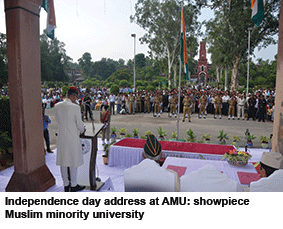 Even as all major political parties have started to gear up for next year’s legislative assembly election in India’s most populous (215 million) state of Uttar Pradesh, a game-changer pre-election skirmish is being fought in the Supreme Court of India on the issue of the minority status of Aligarh Muslim University (AMU) which dominates the eponymous town (pop.1.2 million).
Even as all major political parties have started to gear up for next year’s legislative assembly election in India’s most populous (215 million) state of Uttar Pradesh, a game-changer pre-election skirmish is being fought in the Supreme Court of India on the issue of the minority status of Aligarh Muslim University (AMU) which dominates the eponymous town (pop.1.2 million).
Established in 1877 as the Muhammadan Anglo Oriental College by anglophile social reformer Sir Syed Ahmad Khan (1817-1898) to nurture and shape leaders of the country’s socio-economically backward 150-million strong Muslim community, over the past 129 years AMU has transformed into the country’s showpiece Muslim minority-run university providing high-quality higher education to 32,000 students instructed by 1,600 faculty. But now the BJP-NDA government, which was swept to power in New Delhi in General Election 2014, has questioned the minority status of AMU.
First on January 11, 2016 and then three months later on April 4, the attorney-general of India Mukul Rohatgi informed the Supreme Court that the Central government is withdrawing its appeal against a Allahabad high court judgement of 2006 (Dr. Naresh Agarwal & Ors vs. Union of India (WP No.15504 of 2005)) which struck down AMU’s minority status. The Congress-led UPA government (2004-14) had filed an appeal in the apex court against this judgement which rejected the constitutional validity of the AMU (Amendment) Act, 1981 under which Parliament declared AMU a minority university.
In its writ of appeal against the Allahabad high court verdict, the UPA-II government justified enactment of the AMU (Amendment Act) on the ground that AMU was founded by members of the Muslim community in 1877, and as such was entitled to protection under Article 30 of the Constitution which confers the right “to establish and administer educational institutions of their choice” on religious and linguistic minorities. Now the Union government which is one of four appellants against the Allahabad judgement has made plain its intent to withdraw from the case, currently being heard by a three-judge bench of the Supreme Court.
In the event of the judges of the apex court upholding the Allahabad high court’s judgement in Dr. Naresh Agarwal & Ors vs. Union of India, loss of minority status will be a huge setback for AMU. As a minority institution, it has the right to reserve up to 50 percent of capacity for Muslim students in all study programmes without being obliged to reserve 49 percent of capacity for other backward castes (OBCs), scheduled castes (SCs) and scheduled tribes (STs) – mandatory for all Central-funded institutions of higher education. Moreover, minority higher education institutions enjoy full freedom in faculty and other appointments.
“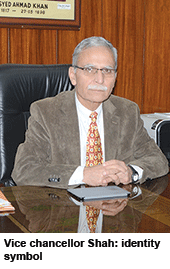 I have received instructions to withdraw the Union government from this appeal. The stand of the Union of India is that AMU is not a minority institution. As the executive government at the Centre we cannot be seen as setting up a minority institute in a secular state”, Rohatgi told a three-judge bench of the Supreme Court presided by Justice J.S. Khehar, adding that the appeal against the Allahabad high court judgement of 2006 which struck down the constitutional validity of the AMU (Amendment) Act, 1981, had been filed by the previous UPA government. According to Rohatgi, the incumbent government at the Centre is in agreement with the Allahabad high court verdict which held that AMU was “established” by the AMU Act of 1920 legislated by the administration of British India, not by Sir Syed Ahmad Khan and members of the Muslim community 43 years earlier.
I have received instructions to withdraw the Union government from this appeal. The stand of the Union of India is that AMU is not a minority institution. As the executive government at the Centre we cannot be seen as setting up a minority institute in a secular state”, Rohatgi told a three-judge bench of the Supreme Court presided by Justice J.S. Khehar, adding that the appeal against the Allahabad high court judgement of 2006 which struck down the constitutional validity of the AMU (Amendment) Act, 1981, had been filed by the previous UPA government. According to Rohatgi, the incumbent government at the Centre is in agreement with the Allahabad high court verdict which held that AMU was “established” by the AMU Act of 1920 legislated by the administration of British India, not by Sir Syed Ahmad Khan and members of the Muslim community 43 years earlier.
Ever since the Hindu right-wing BJP led by Narendra Modi won a thumping majority in the Lok Sabha elections of 2014, the general expectation was that it was the beginning of the end of the alleged ‘appeasement’ of the Muslim community.
Nevertheless the new government’s withdrawal from the AMU appeal in the apex court has taken leaders of the minority Muslim community by surprise.
However, there were straws in the wind. On January 9 this year when former Kerala chief minister Oomen Chandy met Union human resource development (HRD) minister Smriti Irani to solicit funds from the ministry to upgrade AMU’s affiliated centre in Mallapuram, she reportedly told Chandy that the AMU off-campus centres in Kerala, West Bengal, and Bihar are unauthorised and illegal. A few days later on January 11, Rohatgi made his first statement in the Supreme Court announcing withdrawal of the Central government from the appeal against the Allahabad high court 2006 judgement.
Even as the Supreme Court bench has stayed the Allahabad high court’s judgement pending final adjudication, for the great majority of Muslim intellectuals and the community’s small middle class, the BJP-NDA government’s withdrawal of support to the AMU management which is fighting to retain the varsity’s minority status, is being interpreted as a betrayal by prime minister Modi who has repeatedly assured the community “complete assistance in ameliorating their social conditions and addressing their educational requirements.”
“It’s shocking that the BJP government at the Centre has declined to defend the AMU (Amendment) Act, 1981. If AMU loses its minority status, it won’t be able to reserve 50 percent of seats for Muslim students. This would be a great loss to the community and will defeat the prime objective of AMU to provide Muslims higher education opportunities. Rohatgi’s withdrawal statement in the Supreme Court signals to the Muslim community that prime minister Modi’s slogan sab ka sath, sab ka vikas (development for all) is hollow. It indicates that the Modi government does not want Muslims to avail higher education”, says Bahar U. Barqi, a political science and law graduate of AMU, and counsel of the AMU Old Boys Association, a co-petitioner in the appeal being heard in the Supreme Court.
Lt. Gen (Retd.) Zameer Uddin Shah, vice chancellor of AMU, is equally “disappointed and shocked” by the Central government’s withdrawal from the appeal. “AMU is not only a university founded by the Muslims of India, it’s a symbol of our identity, an institution that inspires great pride in the community. Various research studies including the reports of the Sachar and Ranganath committees have highlighted that the socio-economic condition of Muslims is worse than even of Dalits in all spheres, and particularly in education. Preservation of AMU’s minority status is vital to enabling a substantial number of Muslims to access higher education”, says Shah, an alumnus of National Defence Academy, Khadakvasla and Army War College, Mhow who served a distinguished 40-year career in the Indian Army before he was appointed vice chancellor of AMU in 2012.
For the highly-rated and ranked AMU, controversy over its minority status is business as usual. Promoted in 1877 by Sir Syed Ahmad Khan and members of the Muslim community as the Muhammadan Anglo Oriental College, the college was upgraded into a university by the British administration through legislation of the AMU Act, 1920 which in its preamble described it as a higher education institution established by the Muslim community. After India attained its independence in 1947, the AMU Act was amended in 1951 to make hitherto compulsory religious instruction optional. However it’s noteworthy that the amendment did not forbid religious instruction which is proscribed for government-promoted universities.
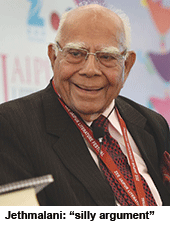 Subsequently in 1965, following controversy over 75 percent reservation of capacity for “internal students” i.e, those who had studied in AMU-run schools/colleges, AMU reduced reservation for “internal students” to 50 percent. This reduction led to protests and violence on the campus, prompting the then Congress government at the Centre to amend the AMU Act to abolish the governance and administrative powers of the University Court. Following the amendment the role of the court was reduced to that of advisor to the Visitor (President of India) and AMU’s executive council.
Subsequently in 1965, following controversy over 75 percent reservation of capacity for “internal students” i.e, those who had studied in AMU-run schools/colleges, AMU reduced reservation for “internal students” to 50 percent. This reduction led to protests and violence on the campus, prompting the then Congress government at the Centre to amend the AMU Act to abolish the governance and administrative powers of the University Court. Following the amendment the role of the court was reduced to that of advisor to the Visitor (President of India) and AMU’s executive council.
The Union government’s administrative intervention of 1965 was not welcomed by all members of the Muslim community. It prompted one S. Azeez Basha to file a writ petition in the Supreme Court contending that the intervention infringed the right of minorities to “administer” their institutions without interference as guaranteed by Article 30 (1) of the Constitution. In 1967, in S. Azeez Basha vs. Union of India (1968 SCR 833) the Supreme Court ruled that AMU wasn’t a minority institution because it had been established by an Act of the pre-independence British India government. The court also ruled that under Article 30 of the Constitution, because of the secular character of the Indian state, Parliament is not empowered to establish a minority institution.
In the aftermath of the apex court’s judgement in the Azeez Basha case, numerous protest demonstrations were staged by AMU alumni and students and hectic parleys with politicians cutting across party lines, for a period of over 14 troubled years. Finally in 1981 when the Congress party led by Indira Gandhi was returned to power at the Centre after it was decimated in the post-emergency general election of 1977, it enacted the Aligarh Muslim University (Amendment) Act, 1981, which overruled the Supreme Court’s verdict in Azeez Basha’s case and confirmed the minority status of AMU. It defined AMU as “the educational institution of their choice established by the Muslims of India, which originated as the Muhammadan Anglo-Oriental College, Aligarh and which was subsequently incorporated as the Aligarh Muslim University.”
The AMU (Amendment) Act, 1981, widely celebrated as a huge victory for minority education institutions, restored all the rights and privileges of a Central government-funded minority university. But almost a quarter century later after the Babri Masjid was destroyed in 1992, the RSS and forces of Hindu majoritarianism were on the march once again resulting in the installation of the first-ever BJP-led government at the Centre (1999-2004). In 2005, Dr. Naresh Agarwal and others filed a writ petition (WP 15504 of 2005) in the Allahabad high court, challenging the reservation of 50 percent of seats for Muslims in AMU’s Jawaharlal Nehru Medical College. In the first instance, Justice Arun Tandon ruled that conferment of minority status by Parliament through the AMU (Amendment) Act, 1981 was ultra vires and unconstitutional. This verdict was upheld by a division bench comprising JJ Ajoy Nath Ray and Ashok Bhushan of the court which dismissed the appeal of the AMU management and the Congress-led UPA-I government on January 5, 2006.
Inevitably, several appeals against the Allahabad high court’s 2005/2006 verdicts were filed in the Supreme Court. Among the appellants are AMU, the Central government, the AMU Old Boys Association and Muqeet Chaudhary, an AMU alum. But as indicated above, the newly-elected BJP-NDA government at the Centre has withdrawn its appeal against the Allahabad high court’s 2006 judgement. “Now, it is for the university, whether it adopts a contrary view to pursue the appeal”, attorney-general Mukul Rohatgi told the Supreme Court on April 4. At Rohatgi’s request the court granted eight weeks time to place the statement of the government on record. The court also permitted AMU to file its response to the government’s stand allowing four weeks time.
Meanwhile, AMU vice chancellor Zameer Uddin Shah maintains that it was the Muslim community which initially established the university. “It was Sir Syed Ahmad Khan and members of the Muslim community that provided lands, buildings, colleges and an endowment of Rs.30 lakh – a huge sum in those days – to promote the university. This endowment was a precondition to the British India government enacting legislation to upgrade Muhammadan Anglo Oriental College into a university in 1920.
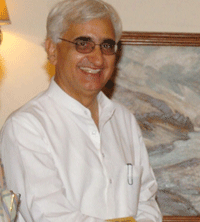 To contend that AMU was ‘established’ by an Act of the British legislature is flawed because MAOC was converted into a university in the only manner a university could be brought into existence at the time, viz, by invoking the exercise of the sovereign authority then ruling India. Therefore the actual promotion and ‘establishment’ of AMU was by Sir Syed Ahmad Khan and the Muslim community. Moreover, it’s important to note that the AMU administration was not a party in the Azeez Basha Case and hence had no opportunity to represent its case”, says Shah.
To contend that AMU was ‘established’ by an Act of the British legislature is flawed because MAOC was converted into a university in the only manner a university could be brought into existence at the time, viz, by invoking the exercise of the sovereign authority then ruling India. Therefore the actual promotion and ‘establishment’ of AMU was by Sir Syed Ahmad Khan and the Muslim community. Moreover, it’s important to note that the AMU administration was not a party in the Azeez Basha Case and hence had no opportunity to represent its case”, says Shah.
Unsurprisingly the higher judiciary’s narrow technical interpretation of Article 30 (1) and the word ‘establish’ in particular without taking judicial notice of the wider political and socio-economic facts and circumstances has invited criticism from eminent jurists and legal eagles. “How on earth can a minority possibly ‘establish’ a university except by asking the government to get enacted a law incorporating the body it has formed, thus conferring on it a legal personality… The Modi government’s reversal of the Union government’s stand on Aligarh Muslim University not only perpetuates a grievous wrong but betrays a poor understanding of the issues at stake”, writes A. G. Noorani, senior counsel of the Bombay high court and well-known newspaper columnist (Hindustan Times, The Hindu, Dainik Bhaskar) and author of several authoritative books including Islam, South Asia & the Cold War (2012) and the Destruction of Hyderabad (2014), in Frontline (February 16, 2016).
Likewise Ram Jethmalani, MP, former Union law minister and one of the most respected (and expensive) senior counsel of the Supreme Court who had introduced a private member’s Bill in Parliament in 1980 to confirm AMU’s minority status, is also outraged by the Allahabad high court and Supreme Court judgements. “AMU is one of the greatest achievements of the Muslim community in India. What is this silly argument that it was set up by Parliament? There is nothing to gain by destroying its minority status. It’s only good for Indian secularism that it remains”, Jethmalani told a reporter of the Delhi-based weekly Outlook (May 16, 2016).
Jethmalani’s high opinion of AMU is endorsed by academic agencies and institutional rating and ranking surveys. The Bangalore-based National Assessment and Accreditation Council of India (NAAC) has awarded it top ‘A’ grade certification and the Union HRD ministry’s recently released National Institutional Ranking Framework (NIRF) survey ranks AMU #10 countrywide. Moreover, the Delhi-based weekly India Today ranks AMU’s faculty of law #6 and Jawaharlal Nehru Medical College #12 countrywide in its Best Colleges Rankings 2016. In the BRICS & Emerging Economies Rankings 2016 of the London-based Times Higher Education, AMU is ranked #150.
Distinguished AMU alumni include Dr. Zakir Hussain, former President of India; Hamid Ansari, incumbent vice president of India; Abdullah Sheikh Mohammed, former chief minister of Jammu & Kashmir; former Union minister Mohsina Kidwai; Saheb Singh Varma, former chief minister of Delhi; actor Naseeruddin Shah; poet Javed Akhtar; noted historian Irfan Habib; national hockey star Zafar Iqbal and a host of high court justices, doctors, engineers, and other professionals.
 In the circumstances the BJP-NDA government’s patent lack of enthusiasm for supporting the minority status of AMU and prosecuting the appeal against the Allahabad high court’s 2006 judgement, is roundly condemned by spokespersons of the Muslim community.
In the circumstances the BJP-NDA government’s patent lack of enthusiasm for supporting the minority status of AMU and prosecuting the appeal against the Allahabad high court’s 2006 judgement, is roundly condemned by spokespersons of the Muslim community.
“Several surveys including the Sachar Committee Report (2007) have confirmed that the poverty of Muslims is the deepest among all communities. Therefore, Muslims need access to good schools and colleges and higher education. Abolition of the minority status of AMU will deny thousands of Muslim students higher education”, says Prof. Talat Ahmad, vice chancellor of the Jamia Millia Islamia (JMI) University, Delhi, also established in Aligarh in 1920, but later shifted to Delhi in 1925. It’s pertinent to note that JMI – the other centrally-funded Muslim minority university of India – was also established by an Act of Parliament in 1988. Therefore the Supreme Court’s verdict in the AMU case will directly impact it.
Little wonder that AMU’s minority status issue has snowballed into a major political issue. “By withdrawing the government’s appeal in the Supreme Court, the NDA government has flouted all constitutional propriety and gone against the spirit of Article 30. The BJP/NDA government’s invocation of the Supreme Court judgement in the Azeez Basha Case is incorrect as the AMU Amendment Act, 1981 unequivocally confirms that AMU was established by Muslims and for Muslims. The new BJP/NDA government has let down the country’s Muslim minority”, says Salman Khurshid, Congress leader and former Union minister of the Congress-led UPA government.
Although technically the BJP/NDA government is perfectly within its rights to decline to pursue the appeal filed against the 2006 judgements of the Allahabad high court by the predecessor government and leaving it to the other appellants to press on at their option, this act of omission is inevitably being interpreted as additional proof of the BJP’s anti-Muslim prejudice. “The Modi government doesn’t want minorities or minority institutions to progress and develop. In most countries governments try to uplift minority communities by offering affirmative action and special concessions in education. But the BJP government wants to deny them education opportunities in their own institutes and keep them down”, says Meem Afzal, Congress national spokesperson and former MP from Uttar Pradesh.
Adds Congress party spokesperson Tom Vaddakan: “Because of persistent interference from the government and HRD ministry, India’s universities have been transformed into war zones, as in Jawaharlal Nehru University, Hyderabad University and now AMU. Even though it had been accepted for decades that AMU was promoted, funded and built by Muslims, the BJP-NDA alliance is intent on stirring the pot by its minority status and polarising the state’s electorate. This is part of a larger RSS agenda to wrest control of the country’s universities and higher education institutions.”
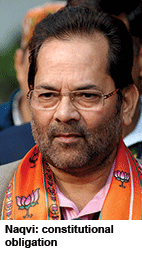 However Mukul Kanitkar, joint organising secretary of the Nagpur-based Bharatiya Shiksha Mandal (BSM), an RSS affiliated education organisation, says that it’s for the apex court – not the BJP – to determine whether AMU is a minority institution. “A secular government cannot fund an educational institute for any religious minority. Minority communities have every right to set up their own institutes, but they should be privately and not state funded. It’s important for the Supreme Court to pronounce a clear judgement on this issue. There are hundreds of so-called minority institutions run by Christians and other minorities which are deriving all advantages of minority status and receiving government subsidies. This is absolutely wrong”, says Kanitkar.
However Mukul Kanitkar, joint organising secretary of the Nagpur-based Bharatiya Shiksha Mandal (BSM), an RSS affiliated education organisation, says that it’s for the apex court – not the BJP – to determine whether AMU is a minority institution. “A secular government cannot fund an educational institute for any religious minority. Minority communities have every right to set up their own institutes, but they should be privately and not state funded. It’s important for the Supreme Court to pronounce a clear judgement on this issue. There are hundreds of so-called minority institutions run by Christians and other minorities which are deriving all advantages of minority status and receiving government subsidies. This is absolutely wrong”, says Kanitkar.
Certainly AMU is by no means the first minority-run education institution to be financially aided by the Central and/or state governments as BJP spokespersons imply. In post-independence India, it’s a well-established practice for the Central and state governments to provide financial aid to minority educational institutions. For instance in the top-ranked St. Stephen’s College, Delhi – a minority institution run by the Church of North India – the entire salary bill of faculty and staff is paid by the Central government. In Kerala, almost all private aided schools, promoted by Christian missionaries, receive similar grants from the state government. Moreover Article 30 (2) of the Constitution clearly states that the “State shall not, in granting aid to educational institutions, discriminate against any educational institution on the ground that it is under the management of a minority, whether based on religion or language.”
However Mukhtar Abbas Naqvi, minister of state for parliamentary and minority affairs of the BJP/NDA government at the Centre, believes that an “unnecessary political controversy” has been generated by the opposition parties about a complex legal issue. “This issue is sub judice in the Supreme Court which will adjudicate on it. The government is run under the Constitution and will abide by the court’s verdict. The government is not against Muslims or minorities but is obliged to follow the provisions of the Constitution of India”, says Naqvi.
Nevertheless, even as legal arguments for and against minority status for AMU are being advanced in the Supreme Court, in Uttar Pradesh, which will elect a new legislative assembly next year, AMU has become a hot button political issue. At an election meeting held on June 18, leaders of the state’s RSS and BJP units distributed a booklet titled National Reservation Policy and Aligarh Muslim University which argues that AMU has been evading its legal obligation to allocate 49.5 percent of its capacity to OBC, SC and ST youth for over a decade by claiming minority status.
 Unsurprisingly, in Uttar Pradesh where religion and caste considerations decide election results, AMU’s minority status has aroused passions. By announcing its intent to withdraw the Central government’s appeal against the Allahabad high court’s 2006 judgement which denies minority status to AMU, the BJP has reiterated its stand against ‘appeasement’ of the Muslim community. This is being interpreted as a political gambit to consolidate the Hindu vote in UP, where the majority community constitutes 79.7 percent of the electorate. Although legally this will have little impact on AMU’s appeal petition in the apex court, it’s a clear signal to the Muslim community that the BJP-NDA alliance is not interested in farming the votes of minority communities and is determined to push its majoritarian agenda.
Unsurprisingly, in Uttar Pradesh where religion and caste considerations decide election results, AMU’s minority status has aroused passions. By announcing its intent to withdraw the Central government’s appeal against the Allahabad high court’s 2006 judgement which denies minority status to AMU, the BJP has reiterated its stand against ‘appeasement’ of the Muslim community. This is being interpreted as a political gambit to consolidate the Hindu vote in UP, where the majority community constitutes 79.7 percent of the electorate. Although legally this will have little impact on AMU’s appeal petition in the apex court, it’s a clear signal to the Muslim community that the BJP-NDA alliance is not interested in farming the votes of minority communities and is determined to push its majoritarian agenda.
“Former President of India Dr. Zakir Husain had remarked that “the way Aligarh participates in various walks of national life will determine the place of Muslims in India’s national life. The way India conducts itself towards Aligarh will determine largely the form which our national life will acquire in the future”. AMU stands for pluralism, inclusiveness and unity in diversity. The government’s attitude towards AMU will showcase how minorities are treated in India”, says AMU vice chancellor Zameer Uddin Shah.
Though AMU has lost Central government support in its legal battle for restoration of its minority status, the final word on this issue will be of the learned judges of the apex court. Whether they reconsider the court’s earlier judgement in the Azeez Basha Case upheld by the Allahabad high court after an interregnum of four decades and reinstate the minority status of AMU, will determine the future of this premier vintage university which has become a symbol of pride for India’s beleaguered Muslim minority community.














Add comment